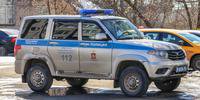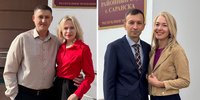The Case of Neverov and Others in Saransk
Filter
- #
- #
The Supreme Court of the Republic of Mordovia, as a result of an appeal against the chosen measure of restraint, releases Mikhail Shevchuk, Ivan Neverov and Artem Velichko from the pre-trial detention center under house arrest. The believers spent more than 2.5 months behind bars.
- #
The court changes the measure of restraint for believers from house arrest to a ban on certain actions.
- #
The criminal case against Artem Velichko is separated into a separate proceeding.
- #
The case of Ivan Neverov and Mikhail Shevchuk is submitted to the Proletarsky District Court of Saransk. It will be considered by judge Inna Balyasina.
- #
About 30 people are present at the first hearing. The defendants say they do not consider themselves guilty. Ivan Neverov notes that the essence of the accusation boils down to participation in worship services via video link. He emphasizes: "The prosecutor did not take into account the fundamentals of Christianity, to which Jehovah's Witnesses belong. From the very beginning of their existence, Christians have kept in touch with each other and held joint worship services with common prayers and the singing of spiritual songs." Mikhail Shevchuk agrees with Neverov's arguments and adds that he professes his faith following the example of Jesus Christ.
Both believers note that the accusation does not contain any indications of extremism in their actions. Similar statements are made during the interrogation of witnesses. For example, Murlaev, an employee of the Center for Counteracting Extremism, talks about the infiltration of two informants into a group of believers and notes that during the years of operational-search activities, he has not heard any extremist calls from the defendants.
Another witness, a 78-year-old man, retracts his testimony to the investigator and states that he did not say what is recorded in it.
- #
Interrogation of the secret witness Semyonova. The defense files a motion to declassify it.
The defense lawyer, addressing the court, says: "This is not the first time I have participated in this kind of cases and I draw attention to the fact that this is really the most harmless confession that exists. Nevertheless, the defendants are being charged under the most serious article."
The court denies the motion.
- #
The defendants again petition for the declassification of the identity of witness Semyonova, because the witness herself during interrogation in court confirmed that there were no threats, violence or other actions against her that would cause reasonable fears about security. Moreover, interrogation in such a mode, according to Neverov, deprives the defendants of the opportunity to ask questions that help to identify false testimony on the part of the witness. The court does not accept these arguments and refuses to satisfy the petition.
Two witnesses for the prosecution are being questioned via videoconferencing. Among them is Sergey Vlasov, who had previously participated in another trial of believers in Saransk. Then his identity was also initially classified, but later the court declassified Vlasov.
- #
Interrogation of the secret witness Andreev. The defense and the defendants file a motion to declassify it and ask for interrogation in the courtroom. According to Ivan Neverov, this is necessary, since during the trial it was obvious that the secret witnesses had repeatedly testified according to the instructions received.
- #
The defense is petitioning for the declassification of the secret witness "Vasily Alekseev", who died by the time the case was considered in court. The lawyer refers to the fact that after the death of a witness, there is no need to keep his identity classified. The prosecution disagrees. The court refuses to satisfy the petition.
The defense also asks to recognize the use of the testimony of a deceased witness in court as inadmissible, since this violates the defendants' right to a fair trial, since there is no opportunity to interrogate the witness. The court will decide on this petition later.
Earlier, one of the prosecution witnesses stated that he saw Neverov at a certain time and in a certain place in Saransk. The defense requested a number of documents confirming that Neverov was in another city at that time. The court agrees.
The study of the case materials begins.
- #
Over the course of five sessions, the court reviews recordings of conversations between Jehovah's Witnesses and persons who portrayed interest in the Bible. At the same time, the defendants themselves did not participate in such conversations.
The defense repeatedly draws attention to the fact that the recordings do not contain anything that falls under the definition of extremism, and the prosecutor gives not a legal, but a religious assessment of the content of the conversations, expressing his personal opinion about what should be believed. The defense files a motion asking the court to ban discussion of the defendants' religious beliefs.
- #
The prosecutor requests 9 years imprisonment for Neverov and 8 years for Shevchuk.
- #
Mikhail Shevchuk gives his final statement. Defendant Mikhail Shevchuk's last word in Saransk - #
Ivan Neverov gives his final statement.
The Final Statement of Defendant Ivan Neverov in Saransk - #
- #
Mikhail Shevchuk is in pretrial detention center No. 1 for the Republic of Mordovia. He his adapting to the new conditions. After quarantine, he was placed in a common cell, where three people are held with him. The situation is calm; his cellmates do not smoke. The attitude of the detention center staff toward him is fine.
Prisoners are taken out for walks; visits and phone calls are also allowed. Shevchuk does not have a Bible, but he receives letters from family and friends. They help him remain positive.
- #
Ivan Neverov is in pretrial detention center No. 1 for the Republic of Mordovia. He shares a cell with three other prisoners, and relations with them are good. However, living conditions remain difficult: the building is in disrepair; his mattress and pillow are worn-out. The administration of the pretrial detention center ignores Ivan's numerous written requests for new bedding.
Moreover, the believer faces restrictions when receiving parcels — according to him, the weight allowance is regularly reduced. Attachments are removed from the letters: a calendar, postcards with images of animals. Complaints against the censor's actions are left unanswered. Reading the Bible helps Ivan stay calm.

